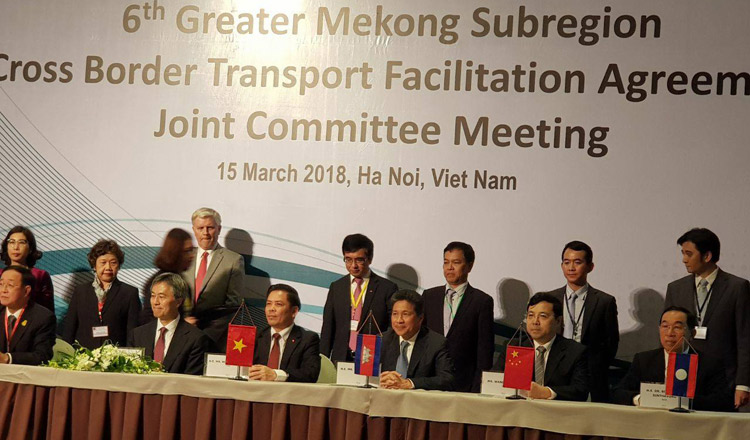GMS countries sign new deal, boost transport connectivity
Greater Mekong Subregion (GMS) countries reached an agreement last week on the implementation of the cross-border transport facilitation agreement (CBTA), which, starting June 1, will enable the issuance of regional road transport permits and temporary admission documents for commercial vehicles.
Transport ministers from Vietnam, Cambodia, Laos, Myanmar, Thailand and China signed on Thursday a memorandum of understanding (MoU) on the ‘early harvest’ implementation of the CBTA during the sixth meeting of the joint committee for the CBTA in Hanoi.
“The ministers are pleased to announce completion of the signature of the MoU, allowing the effective launch of GMS road transport permits and temporary admission documents for commercial vehicles starting June 1,” a statement from the Cambodian Ministry of Public Works and Transport said.
CBTA is an agreement that seeks the elimination of border inspections within GMS. It promotes the eradication of intermediary stops (also known as transshipment), and seeks to boost commercial activity by reducing the amount of time spent crossing borders.
The deal reached last week grants all member countries a quota of 500 cargo trucks to cross borders using temporary admission documents, which covers both lorries and the containers they carry.
The ministers also agreed to continue to work towards the common goals of transforming transport corridors into economic corridors and aligning their transport and trade facilitation efforts with the Asean Economic Community Blueprint 2015 and investment needs identified in the GMS regional investment framework.
Sin Chanthy, president of the Cambodia Freight Forwarders Association (CAMFFA), said that while countries like Thailand, Myanmar and Lao have been able to implement the CBTA smoothly, Cambodia is facing more difficulties, particularly when it comes to truck and container regulation. For example, he said Cambodian companies have been unable to purchase insurance in other GMS countries.
“Not all countries have adopted and harmonised the ‘one-stop-shop’ system, and we still have to do customs clearance in each country,” he said. “There is no single-stop inspection system in place, which makes things a lot harder for transport companies.”
Var Sim Sorya, spokesman for the Ministry of Public Works and Transport, told Khmer Times that up until this point most developments in cross-border facilitation were country-to-country, and added that he hoped starting June all commercial cross-border movement in GMS will be simplified.
“So far only buses have been able to move freely across borders,” he said. “We hope that starting June the complex procedure involved in crossing borders for trucks will also be simplified.”
Mr Sorya said the ministry will soon start registering transport companies and trucks as well as conducting vehicle inspections. The information will be shared with other GMS governments to facilitate cross-border movement.
Source: http://www.khmertimeskh.com/50114649/gms-countries-sign-new-deal-boost-transport-connectivity/


 Thailand
Thailand




